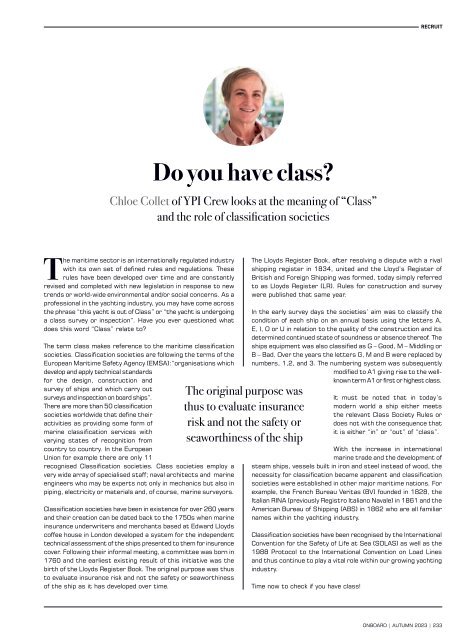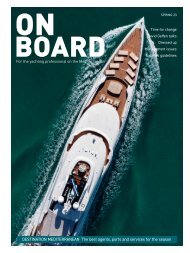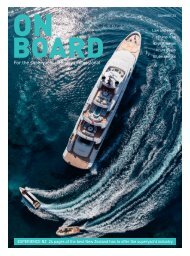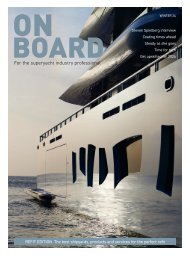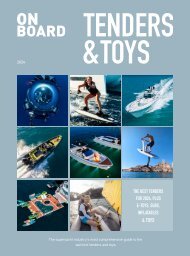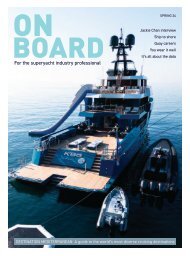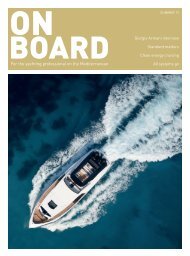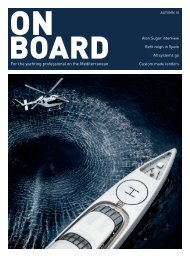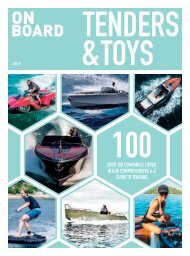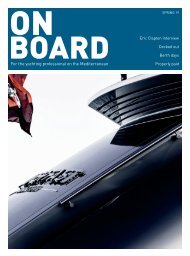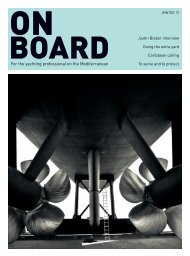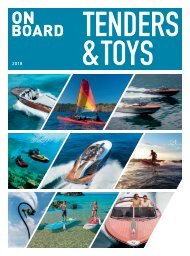ONBOARD Magazine autumn 2023
ONBOARD is aimed purely at the superyacht professional – whether onboard or shoreside. 100% of your spend will hit your targets on the Mediterranean from Palma in Mallorca, Barcelona, through France to Genoa and beyond together with Montenegro and the Aegean, plus the eastern seaboard of Florida. We hand deliver every copy to superyachts over 30m to make sure your message gets in to the hands of the decision makers on board. The publication is also delivered to relevant businesses around the ports and marinas together with shipyards. We also attend the major yacht shows in Monaco, FLIBS, METS, Boote Dusseldorf, Palma and MYBA for on site distribution. Plus, we post over 500 copies to relevant businesses not on the Mediterranean such as the UK, the Netherlands, Germany the rest of northern Europe and of course the USA and Caribbean. We work hard to develop a publication that all the crew and land based decision makers will read from cover to cover. An enjoyable and informative read for everyone means your message will be read. Talking about your brand, product, services and your team is essential and with our help, the message hits the right decision makers.
ONBOARD is aimed purely at the superyacht professional – whether onboard or shoreside. 100% of your spend will hit your targets on the Mediterranean from Palma in Mallorca, Barcelona, through France to Genoa and beyond together with Montenegro and the Aegean, plus the eastern seaboard of Florida. We hand deliver every copy to superyachts over 30m to make sure your message gets in to the hands of the decision makers on board.
The publication is also delivered to relevant businesses around the ports and marinas together with shipyards. We also attend the major yacht shows in Monaco, FLIBS, METS, Boote Dusseldorf, Palma and MYBA for on site distribution. Plus, we post over 500 copies to relevant businesses not on the Mediterranean such as the UK, the Netherlands, Germany the rest of northern Europe and of course the USA and Caribbean.
We work hard to develop a publication that all the crew and land based decision makers will read from cover to cover. An enjoyable and informative read for everyone means your message will be read.
Talking about your brand, product, services and your team is essential and with our help, the message hits the right decision makers.
Create successful ePaper yourself
Turn your PDF publications into a flip-book with our unique Google optimized e-Paper software.
RECRUIT<br />
Do you have class?<br />
Chloe Collet of YPI Crew looks at the meaning of “Class”<br />
and the role of classification societies<br />
The maritime sector is an internationally regulated industry<br />
with its own set of defined rules and regulations. These<br />
rules have been developed over time and are constantly<br />
revised and completed with new legislation in response to new<br />
trends or world-wide environmental and/or social concerns. As a<br />
professional in the yachting industry, you may have come across<br />
the phrase “this yacht is out of Class” or “the yacht is undergoing<br />
a class survey or inspection”. Have you ever questioned what<br />
does this word “Class” relate to?<br />
The term class makes reference to the maritime classification<br />
societies. Classification societies are following the terms of the<br />
European Maritime Safety Agency (EMSA):“organisations which<br />
develop and apply technical standards<br />
for the design, construction and<br />
survey of ships and which carry out<br />
surveys and inspection on board ships”.<br />
There are more than 50 classification<br />
societies worldwide that define their<br />
activities as providing some form of<br />
marine classification services with<br />
varying states of recognition from<br />
country to country. In the European<br />
Union for example there are only 11<br />
recognised Classification societies. Class societies employ a<br />
very wide array of specialised staff; naval architects and marine<br />
engineers who may be experts not only in mechanics but also in<br />
piping, electricity or materials and, of course, marine surveyors.<br />
Classification societies have been in existence for over 260 years<br />
and their creation can be dated back to the 1750s when marine<br />
insurance underwriters and merchants based at Edward Lloyds<br />
coffee house in London developed a system for the independent<br />
technical assessment of the ships presented to them for insurance<br />
cover. Following their informal meeting, a committee was born in<br />
1760 and the earliest existing result of this initiative was the<br />
birth of the Lloyds Register Book. The original purpose was thus<br />
to evaluate insurance risk and not the safety or seaworthiness<br />
of the ship as it has developed over time.<br />
The original purpose was<br />
thus to evaluate insurance<br />
risk and not the safety or<br />
seaworthiness of the ship<br />
The Lloyds Register Book, after resolving a dispute with a rival<br />
shipping register in 1834, united and the Lloyd’s Register of<br />
British and Foreign Shipping was formed, today simply referred<br />
to as Lloyds Register (LR). Rules for construction and survey<br />
were published that same year.<br />
In the early survey days the societies’ aim was to classify the<br />
condition of each ship on an annual basis using the letters A,<br />
E, I, O or U in relation to the quality of the construction and its<br />
determined continued state of soundness or absence thereof. The<br />
ships equipment was also classified as G – Good, M – Middling or<br />
B – Bad. Over the years the letters G, M and B were replaced by<br />
numbers, 1,2, and 3. The numbering system was subsequently<br />
modified to A1 giving rise to the wellknown<br />
term A1 or first or highest class.<br />
It must be noted that in today’s<br />
modern world a ship either meets<br />
the relevant Class Society Rules or<br />
does not with the consequence that<br />
it is either “in” or “out” of “class”.<br />
With the increase in international<br />
marine trade and the development of<br />
steam ships, vessels built in iron and steel instead of wood, the<br />
necessity for classification became apparent and classification<br />
societies were established in other major maritime nations. For<br />
example, the French Bureau Veritas (BV) founded in 1828, the<br />
Italian RINA (previously Registro Italiano Navale) in 1861 and the<br />
American Bureau of Shipping (ABS) in 1862 who are all familiar<br />
names within the yachting industry.<br />
Classification societies have been recognised by the International<br />
Convention for the Safety of Life at Sea (SOLAS) as well as the<br />
1988 Protocol to the International Convention on Load Lines<br />
and thus continue to play a vital role within our growing yachting<br />
industry.<br />
Time now to check if you have class!<br />
<strong>ONBOARD</strong> | AUTUMN <strong>2023</strong> | 233


